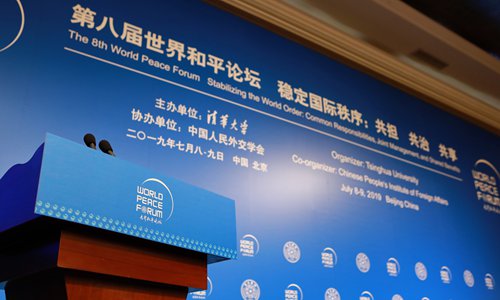HOME >> OPINION
New view of international order bound to rise
By Shen Dingli Source:Global Times Published: 2019/8/11 21:07:17

A scene at the 8th World Peace Forum, which was held in Beijing from July 8 to 9. The theme of the forum was "Stabilizing the World Order: Common Responsibilities, Joint Management, and Shared Benefits." Photo: IC
The current turbulence of China-US relations, to a great extent, stems from the competition between the old view of the international order of the existing major powers like the US and the new views of global order from emerging powers such as China.
The existing international order has many advantages. A number of agreements on some core issues of global governance have been reached, including deals in the fields of international counter-terrorism, nuclear security and climate change.
However, since the 21st century, the US, the main builder of the international order after World War II, has seriously deviated from the path of multilateral cooperation it once advocated. The US government believes that multilateral cooperation is too inefficient and costly. Therefore the country is challenging the post-war order. Because of that, in most areas mentioned above, the pace of global governance has slowed and even gone backwards. The US has withdrawn from the Paris climate deal, Iran nuclear deal, the UN Human Rights Council, UNESCO and the negotiation process of the Trans-Pacific Partnership Agreement (TPP) it once promoted.
In the meantime, some emerging powers, represented by China, continue to maintain multilateral cooperation mechanisms and achievements.
China and other major powers are sticking to the implementation of the Paris climate deal and China is striving for peak carbon emissions by around 2030. As a large carbon dioxide emitter, China is willing to promote the international community to reduce emissions and create a green economy at the expense of restricting and transforming its own traditional development models. China has not only announced this independent will to the international community but also incorporated it into the annual and multi-year national development plan as well.
China, Russia, France, the UK and Germany did not abandon their cooperation with Iran after the US withdrew from the Iran nuclear deal. They have been striving to protect the agreement from being abolished.
When the US is destroying the existing international order, China and other countries stood up and encouraged Iran to fulfill its obligations and share the international responsibility that was waived by the US.
Emerging powers such as China have been cooperating with the US to oppose any cause of instability on the Korean Peninsula and its surroundings. North Korea's development of nuclear weapons, regardless of the reasons, is opposed by China and the US. But the ways of Beijing and Washington differ greatly. The US has been piling maximum pressure on North Korea. However, the method only intensified the situation. The Chinese side advocates an approach which encourages North Korea to abandon its nuclear weapons and prompts the US to lift its sanctions at the same time. On the Korean Peninsula nuclear issue, China's new proposal has proved a better solution than the traditional concepts.
When it comes to global development and international security, new concepts and proposals initiated by China have turned out to be more cooperative and competitive than the old views which the US has adhered to.
The new international order advocated by emerging powers such as China, partly comes from the international cooperation that was once advocated but is now abandoned by the US. Were it not for the US, it would be difficult to imagine the advent of the United Nations, the World Bank, the INF and the WTO. However, with the rise of new powers, these mechanisms are diluting the dominant force the US once had. After increasing number of new sovereign countries entered the international mechanism, the effective decision-making in terms of global institutions have become a challenging task.
Being eager to counter the international terrorist organizations behind the September 11 attack in 2001, the US launched a preemptive strike against Iraq without legality, seriously violating international military principles as defined by the UN Charter. Thanks to US political infighting, the US government withdrew from negotiations of the TPP. The international public goods the US abandoned can only be inherited by other countries. It can be argued that the persistence of China and other new powers over multilateralism is the precise correcting effect of the US abandonment of the international order.
The new international order represented by the newly emerging powers such as China does not simply inherit the positive part of the existing international order. It also reflects the improvement and upgrading of the existing international order. In response to terrorism, separatism and extremism in Central Asia, China and Russia formed the Shanghai Cooperation Organization to shape regional security mechanisms and have succeeded in providing a new security and development cooperation platform in Central Asia and South Asia through connotation and membership expansion.
China has also initiated regional and global infrastructure cooperation, and established relevant international cooperation mechanisms to share its ideas, capabilities and practices with the international community.
China is inheriting the positive factors of the existing international order, promoting the upgrade of the international order and gradually approaching the center of the changing global order. This is not only a natural result of China's efforts of promoting international cooperation, but also an inevitable consequence of the US destruction of the existing international order. Under these circumstances, China's new view of the international order is bound to rise.
The author is a professor with Fudan University. opinion@globaltimes.com.cn
Posted in: VIEWPOINT